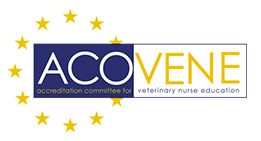- Have any questions?
- +44 020 7222 2001

Precongress Vet nursing stream at the EERVC in Greece
7 Gennaio 2021
ACOVENE Enhances Accreditation Standards for Veterinary Nurse Education Programs
5 Aprile 2024In a progressive move, ACOVENE shifts from skills lists to outcome-based competencies, ensuring the relevance and adaptability of veterinary nursing education. The recently approved third edition of the Dossier of Competencies reflects this evolution, outlining a dynamic framework for professional development.
ACOVENE, the Accreditation Committee for Veterinary Nurse Education, has embraced a forward-thinking approach by transitioning from traditional skills lists to outcome-based competencies in veterinary nursing education. This shift, exemplified in the third edition of the Dossier of Competencies approved by the ACOVENE board in July 2021, marks a significant move from static skill requirements towards a more dynamic and adaptable framework.
Competency, as defined by ACOVENE, encompasses a multifaceted blend of knowledge, skills, and attitudes essential for effective professional performance in veterinary nursing. This holistic approach acknowledges the evolving nature of the profession, emphasizing not only technical proficiency but also the ability to navigate challenges, adapt to change, and handle unforeseen circumstances with confidence and agility.
Distinguishing between "competence" and "skills" is crucial in this paradigm shift. While skills such as administering nursing care or documenting vital signs are important, true competence transcends mere technical proficiency. It requires the application of knowledge with confidence and adaptability across diverse contexts and scenarios.
The competencies outlined in the third edition of the ACOVENE Dossier of Competencies set the expected level and scope for newly qualified veterinary nurses, denoted as "Day One" competencies. These serve as the minimum standard for graduates from ACOVENE accredited schools, providing a solid foundation for their roles within the veterinary profession.
Continuous professional development and lifelong learning are emphasized as indispensable elements of maintaining competency in the field. While achieving day one competence enables veterinary nurses to independently practice at a primary care level under the guidance of a veterinary surgeon, ongoing training and qualifications are essential for progression and specialization within the profession.
ACOVENE entrusts the specific details of learning and assessing these competencies to the educational institutions teaching veterinary nursing. Through rigorous monitoring and periodic accreditation visits, ACOVENE ensures quality and consistency in veterinary nursing education across Europe.
In summary, ACOVENE's adoption of outcome-based competencies represents a significant step towards enhancing the relevance and effectiveness of veterinary nursing education. By embracing a dynamic framework that prioritizes holistic competence over static skills, the third edition of the Dossier of Competencies sets a new standard for excellence in veterinary nursing across Europe. This approach equips veterinary nurses with the requisite knowledge, skills, and attitudes to navigate the complexities of modern veterinary practice with confidence and proficiency.




